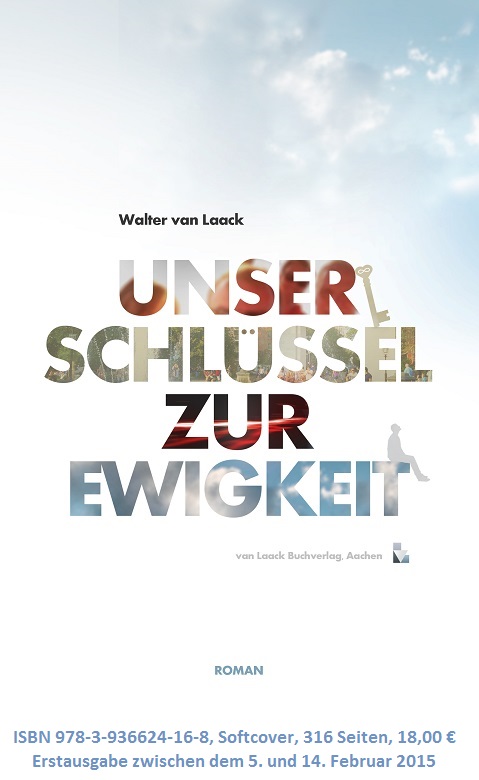 |
A doctor from Aachen discerns a common
denominator for natural science, religions and
philosophy
Prof. Dr. Walter van Laack, an orthopaedic surgeon from Aachen, considers the most decisive interconnections in our world to be still a great mystery. Yet not a few scientists, past and present, believe that we have very nearly attained ultimate knowledge. Many of them like to believe that all the mysteries of our world may be solved by purely materialistic theories which sooner or later will enable us to explain them plausibly. From this stems the notion that there is no room for the divine, for an immaterial spirit, or a soul; the concept of a life after death was long ago relegated to the realms of pure superstition. As a consequence, all religions and the endless flow of philosophic ideas which have developed since time immemorial are, seemingly as a matter of principle, to be considered as obsolete and unfounded. If we take a closer look, however, many of these scientists' so-called "proofs" are by no means conclusive. To be sure, there are well founded concepts today concerning the origin and structure of our universe. Whilst the foundations of such concepts are, in fact, poorly prepared it is the modern media which skillfully entice us to believe that their concepts require only slight adjustments in minor details. Neither the biologist nor the medical expert can tell us what life really is. In fact, not even one of the most esteemed brain scientists is in a position to explain convincingly what our spirit or our consciousness really is and how it works, or what is, for example, the essence of deep feeling or the mystery of a beautiful picture, a sad song or a wonderful symphony. For Dr. van Laack, all materialistic attempts at an explanation in this context seem truly grotesque. The basic flaw in all of these popular models for Dr. van Laack seems to lie in the fact that they do not extend far enough beyond their own professional horizons, irrespective of whether they originate from specific natural sciences, from medical science or from psychology or sociology, or whether they are of religious or philosophical nature. Yet it is exactly this which inevitably stands in the way of our glimpsing the all-embracing truth. To support his attitude, Dr. van Laack quotes the beautiful, probably ancient Buddhist, parable as retold by the 19 th century English writer Godfrey Saxe: In the parable he describes how six blind men try to visualize an elephant. They all feel the animal with their hands and are absolutely convinced that they have learnt everything there is to know about its nature and appearance. However, they fail to notice that each of them had only perceived a small part of the animal, in a similar way as a mathematician only perceives mathematics or a chemist who only perceives chemistry, etc. as is often the case today. So it was that the first blind man thought there was a wall in front of him. The second, who only touched the tusk, thought it was a spear. The third touched the trunk and thought it was a big snake and the fourth thought it was a tree because he touched a sturdy leg. The fifth just touched the ear and thought it was a fan and the sixth only touched the tail and thought it was a rope. In the end they quarreled among themselves as to which of them was right. Over the many centuries, the great philosophers rightlyconsidered themselves as the chosen ones in harmonizing the knowledge about the world in which they lived, and which was then still easily comprehensible using the religious dogmas which dominated all civilizations. Today, many of us, even theologians and philosophers, place blind trust in natural science with its modern, scarcely comprehensible new dogmas. Yet thought and philosophy which might identify common ground and interconnections between scientific knowledge and central religious traditions and which might bring both poles to a better understanding have been successively pushed into the background – not least because the latter are considered to be of no importance today. Many ideas which have obviously been ingrained in humanity since the beginning are now reprehensibly treated with disdain – and this completely irrespective of the fact that no single real proof actually exists which decries them. Over many years Dr. van Laack has made an entirely new and - in this form and representation – unique attempt at harmonizing the confirmed knowledge of physics, cosmology, chemistry, biology and medical science with those, in his view, most important universal core ideas of all religions and those most convincing philosophical approaches since Lao Tse and the wise ancient Greeks. At the same time his ideas tidy up certain theories and even some accepted contradictions which are not easy to understand, even for experts. For him these are mostly a mere consequence of poorly coordinated and not always conclusively interpreted real results of research. And, as complicated the development of our world seems to have been over unbelievably long periods of time, everything in the end seems to be explainable by curiously simple principles. Our world is, according to Dr. van Laack, similar to Origami, the Japanese art of folding paper: some basically simple dexterity creates magnificent pieces of art if combined in the right way. However, such actions require a guiding hand and do not emerge on their own. In his books, especially in his new three-volume series "A Better History of our World", Dr. van Laack introduces his comprehensive alternative world model in a way which is easy to understand and exciting. It is a unique attempt to create a homogeneous and inter-disciplinary synthesis of matter and spirit, of life and death, of the world in which we live and a creative, spiritual intelligence which the Christian calls God, which for the Muslim is Allah, for the Red Indian Manitou and for the Hindu Brahman.
List
of natural philosophical books
by Dr. Walter van Laack:
Englisch
Key To Eternity
ISBN
3-8311-0344-5, Softcover (SC)
256 p. (2000)
A Better History of Our World
Vol. 1, "The Universe"
ISBN
3-8311-1490-0, Softcover (SC),
188 p. (2001)
Vol. 2, "Life"
ISBN 3-8311-2597-X, Softcover (SC)
Vol. 3, "Death"
Softcover, available in 2003
German
Der Roman:
"Unser Schlüssel zur Ewigkeit"
ISBN 978-3-936624-16-8,
316 Seiten (Softcover)
E-Book unter ISBN 978-3-936624-27-4
 |
Schnittstelle Tod -
Aufbruch zu neuem Leben?
ISBN 978-3-936624-10-6 148 S., Paperback, (2010)
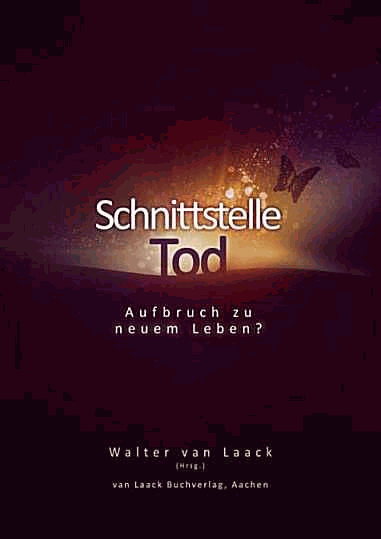 |
In zwei Varianten
erhältlich :
ISBN 3-936624-04-6,
Taschenbuch (SC), 380 S., (2005)
ISBN, 3-936624-07-0, Festeinband (HC), 380 S. (2005)
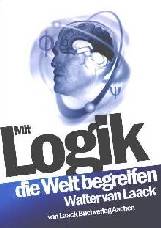 |
Wer stirbt ist nicht tot
ISBN 3-936624-00-3,
Taschenbuch (SC),
312 S., (2003)
ISBN 3-936624-02-X, Festeinband (HC),
312 S., (2003)
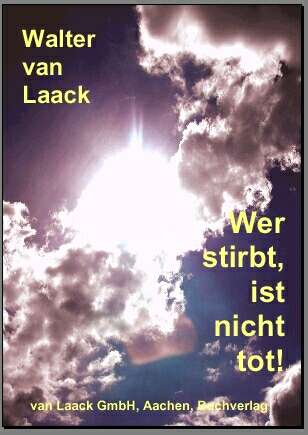 |
Wer stirbt ist nicht tot
ISBN 978-3-936624-12-0, Taschenbuch (SC), 272 S.,
(Komplett überarbeitete und erweiterte Ausgabe 2011)
ISBN 978-3-936624-13-7, Festeinband (HC), 272 S.,
(Komplett überarbeitete und erweiterte Auflage 2011)
|
Eine bessere Geschichte unserer Welt
Band 3, "Der Tod"
Taschenbuch (SC), ab Mitte 2002 erhältlich
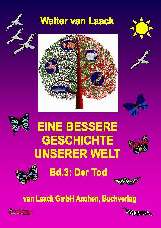 |
Band 2, "Das Leben"
ISBN 3-8311-2114-1, Taschenbuch (SC),
248 S., (2001)
 |
Band 1, "Das Universum"
ISBN 3-8311-0345-3, Taschenbuch (SC),
196 S. (2000)
 |
Der Schlüssel zur Ewigkeit
1. Auflage (1999/2000), HC, ISBN 3-9805239-4-2
als Taschenbuch (SC):
ISBN 3-9805239-5-0
2. komplett überarbeitete Auflage (2000), 288 S.,
SC, ISBN 3-89811-819-3
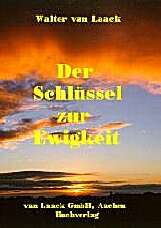 |
Plädoyer für ein Leben nach dem Tod
und eine etwas andere Sicht der Welt"
1. Auflage (1999), ISBN 3-9805239-2-6,
448 S., Festeinband (HC)
2. komplett überarbeitete Auflage (2000), 448 S.,
SC, ISBN 3-89811-818-5
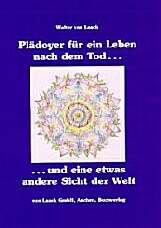 |
Schnittstelle
Tod -
Was spricht für unser Weiterleben?
Tagungsband
zum gleichnamigen Seminar vom 09.11.2013
ISBN 978-3-936624-19-9, 100 S. (SC)
Erscheinungstermin: 14. Februar 2014
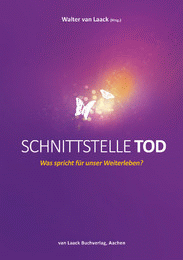 |
Im November 2009
und 2011 fanden in Aachen die ersten beiden Tagungen zu
Nahtoderfahrungen (NTE), Tod und der Frage statt, „gibt es
vielleicht ein Danach?“.
Beide waren ein großer Erfolg, so dass sich viele Interessierte
im November 2013 zum dritten Seminar in Aachen trafen.
Aus den Vorträgen des Aachener Seminars 2013 entstand dieser
Tagungsband. Sie sind nun herzlich eingeladen, den interessanten
Vorträgen und Demonstrationen
(vielleicht ja noch einmal) zu folgen.
Please visit these sites too:
Anm.:
Am 21. Juli 2004 wurde Dr.Walter van Laack vom Rektor der FH
Aachen im Beisein der Prorektorin, des Kanzlers und des
zuständigen Dekans für Biomedizinische Technik zum Professor
ernannt.
![]() Bitte beachten Sie:
Bitte beachten Sie:
Leider kann es
vorkommen, dass bestimmte hier empfohlene Ausgaben bereits in
Neuauflage erschienen
und damit in der alten Version nicht mehr lieferbar sind.
Eine stets aktuelle Bücherliste finden Sie daher hier:
www.vanlaack-buch.de/buecher-books/
![]() Zusatz zum Disclaimer:
Zusatz zum Disclaimer:
Mit Professor van Laack verbinden mich eine gemeinsame
Kindheit und langjährige Freundschaft.
Alle hier angegebenen Preise haben daher rein informativen
Charakter und sind weder verbindlich,
noch vom Autor auf meinen Seiten als bezahlte Werbung geschaltet.
Für Bestellungen wenden Sie sich bitte an den Buchhandel oder
die Webseiten des Autors.
DER TECHNODOCTOR